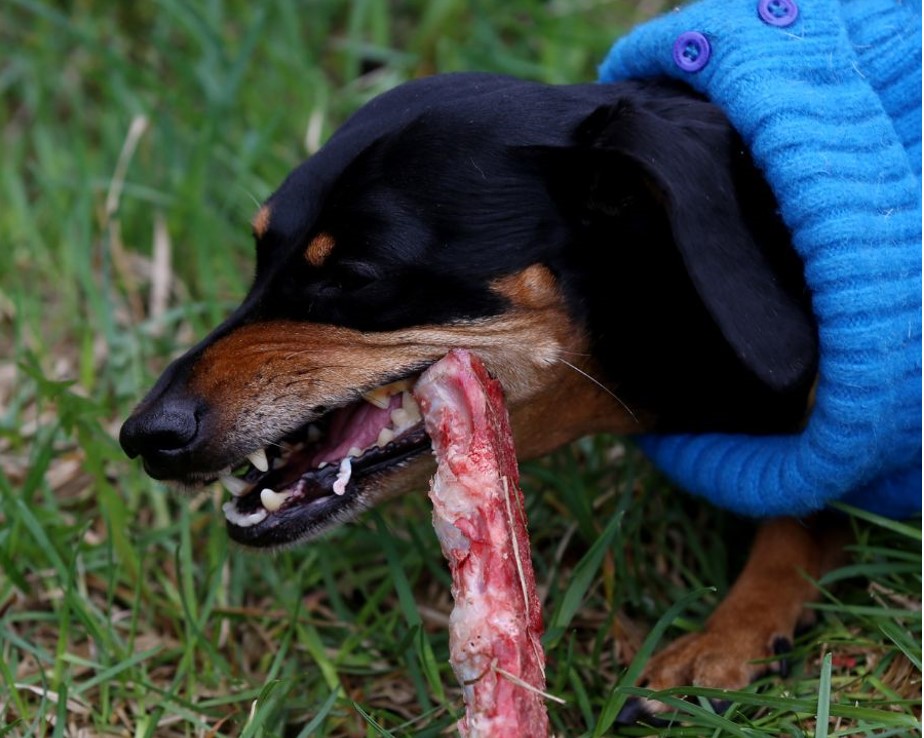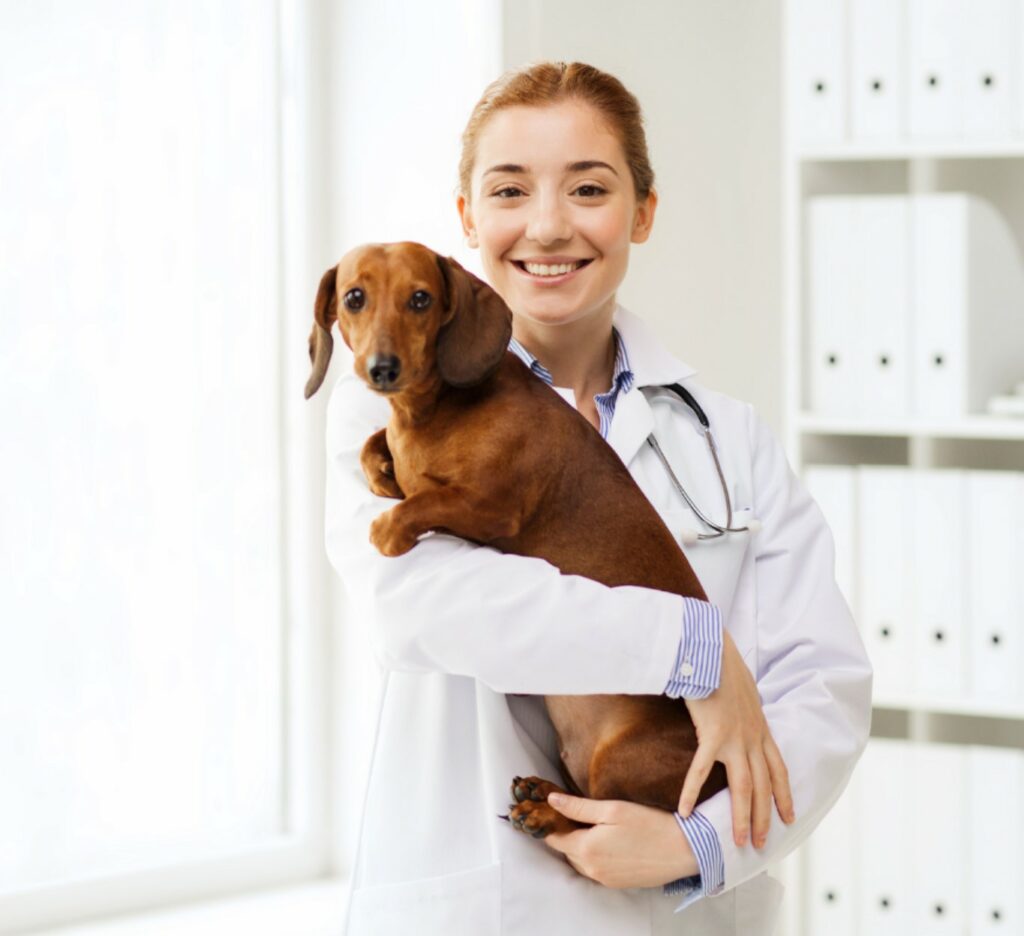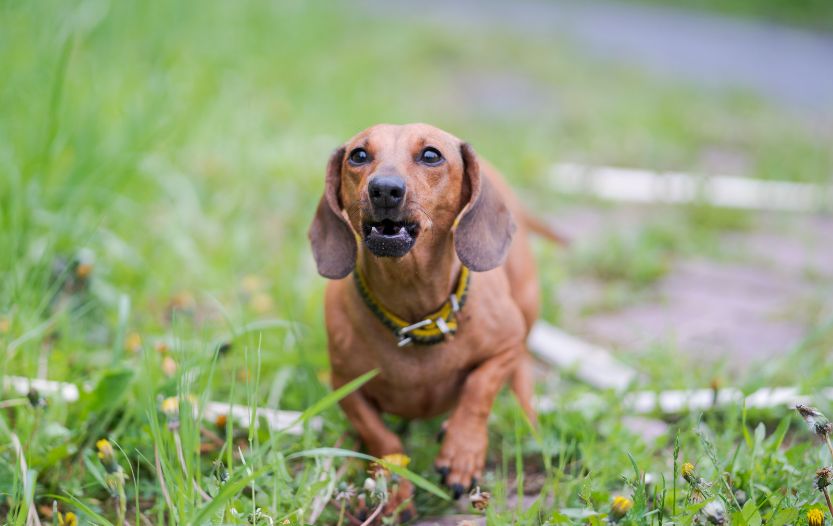By: Jennifer Jenka
Whether you have a mini, tweenie, or standard dachshund, they can bring vibrancy into your household with their quirky behavior and cute stature.
But if your dachshund won’t eat, it may fill you with anxiety and dread. However, there are several reasons your pup may be avoiding his meals.
But first, let’s cover some of the basics like how much your dachshund should weigh, how much dachshunds eat, and reasons your dog won’t eat. Afterward, you will know what to do to make your dachshund eat healthily again.
How Much Should My Dachshund Weigh?
The first step is to determine the ideal weight of your standard, tweenie, or miniature dachshund. Fully grown mini dachshunds should weigh less than 11lbs. A “Tweenie,” which falls between a mini and standard dachshund, should weigh between 11 and 16lbs.
However, for a standard dachshund, it depends on age. If they are between 3-5 months old, they should weigh between 6-13lbs. For 6-11 months, they should be between 12-25lbs, and if they are over a year old, they should weigh between 16-32lbs.
They should be fed according to their ideal weight. And your best bet is to consult your veterinarian about the best weight for your particular dachshund. They will look at the body’s shape and feel for their ribs to see if they are over or underweight. You can do this at home as well.
How Can I Tell If My Dachshund Is Overweight?
First, look at your dog from above. There should be a slight inward curve behind the rib cage and into the back hips. If you see a bulge, then they are likely overweight.
But you should also check their side profile. If your dachshund’s belly hangs down instead of gently curving up to the back hips, this, too, is a sign of obesity.
Lastly, you can feel your dog’s ribcage. If you can’t feel their rib bones under their skin and muscle, they are carrying too much weight.
If they are overweight, this can cause several different health issues like back problems, arthritis, diabetes, and heart problems. So, getting your pup to its ideal weight is vital.
How Much Food Should I Feed My Dachshund?
If you are wondering how much food should I feed my dachshund, that depends on several factors like the age of your dachshund and what their ideal weight should be.

If you have determined that your dachshund is overweight, feed them according to the weight you want them to be at.
First, read the package of dog food you are feeding them. The manufacturers generally list the amount based on age or weight.
An adult dachshund should eat two meals per day, while dachshund puppy food portions should be dished out 3-4 times daily.
If they say feed them a cup daily, give them half a cup in the morning and another half at supper time. Make sure you keep regular meal times and do not leave food down for them all day.
Dachshunds tend towards obesity and are not meant to graze all day like a cow.
Keep in mind that too much food leads to obesity, and dachshunds are particularly prone to overeating and becoming obese. Obesity can cause many health problems.
Conversely, too little food causes nutritional deficiencies.
Leave the dish for 15-20 minutes, and if they don’t eat, it won’t hurt them to miss one meal. But if this persists, and they are still not eating after a day, it is time to grow concerned.
How Long Can My Dachshund Go Without Food?
You should wait no more than three days before seeing a veterinarian. Any longer, and there could be adverse effects on your dog’s health. Ensure they are drinking water because if they are not, they can become severely dehydrated after as little as 48 hours.
8 Reasons Why Your Dachshund Won’t Eat
There can be several reasons your dachshund won’t eat. And since your dog cannot tell you what is wrong and why they won’t eat, you will have to discover what is wrong by the process of elimination.
Here are the top 8 reasons why your dachshund won’t eat and what you can do to help:
1. They May Be Sick
First off, your dog may be feeling ill. They could be having stomach problems, or they may have something else wrong with them.
If they are vomiting and have diarrhea, be sure to get plenty of fluids into them by offering them nice cool water. Call your vet if this persists for more than 8-12 hours.
If your dog has been recently neutered or spayed, it could be a result of the surgery. Not eating is common after such an event, and it may be a day before they want to eat.
If they still haven’t eaten after a day, let your vet know and see what they recommend.
Alternatively, they may have had another injury while playing in the yard. Check their body for lumps, warm spots, and other injuries.
If you find something wrong with them, consult a vet immediately and have them looked over to prevent further harm.
2. Teeth Problems
If you are feeding your dachshund hard dog food, they may have an issue with their teeth. Check out their teeth if they favor one side of their mouth when you play with them with a toy.
Gently lift the sides of the mouth and look for signs of tooth decay. It would appear like brown staining or darkened teeth.

Press on them and see if they react painfully. If you suspect one or more of the teeth are paining them, contact your vet and have them looked at.
Also, dachshunds are prone to crowding teeth in the jaw, leaving them more open to periodontal disease. Food, plaque, and tartar can easily lead to infection and inflammation.
Always be sure to clean your dog’s teeth regularly. If you cannot do it yourself, take them to a groomer who can. In the meantime, try to soak the food to soften it, and if they eat it, you now know the root of the problem.
You can also try soft dog food for a while.
3. They May Not Like the Food
If you have recently switched to a different type of food, it could be that they simply do not like the new food. Try feeding your dachshund their previous kibble.
If they start eating that, you know why they are not eating. They are rejecting what they are given.
Switch back to their previous food, or try another type. If you can avoid it, avoid feeding your dog overly processed foods. Instead, provide them dog food with chicken, rice, carrots, butternut squash, and other hearty fruits and vegetables.
Also, check to see if the food is expired. Their sensitive noses may have picked up something you have not. Always store their food in an airtight container to prevent rot.
Trying giving your dachshund strawberries.
4. They May Not Like The Bowl
Sometimes it can be something as simple as the dog not liking the bowl. It could be too high or low for your pup, or their collar may bump it uncomfortably.
Try using a flat ceramic plate instead. The bowl may also be moving while they are eating, so place a mat underneath or purchase a bowl with a rubber bottom.
Another issue could be the smell of the bowl. If you have recently cleaned it with a new type of cleaner, the odor could be putting them off. Rinse the bowl well and use natural and organic cleaners that are unscented.
5. They Don’t Want to Be Watched
Your dachshund may also not like where the bowl is. Switch it to a more private location, and leave the room. If this is the reason, your dog will likely eat while you are gone.
If this is the case, set up a food station in a tucked away corner where they can have some privacy while they eat.
Also, don’t speak to them or look at them while they are feeding. It could be just a matter of your dachshund being a bit shy.
6. They Want Attention
If your dog is constantly following you, and if you give them table scraps, they may just be seeking more attention and treats. Limit your dog to one treat per day and make them work for it by performing a trick.
Give the treat around the same time of the day, like around lunchtime.
Stick to this schedule. Once they know they will not get any extra table scraps or treats, they should return to eating their regular meals.
7. A Sudden Change May Be Making Them Anxious
If you have just brought a new baby or another animal into their life, your dog may react negatively to the change. Give them some time and some extra attention to reassure them.
Stick to your regular feeding schedule, and consult with a vet if they still haven’t eaten in over 24 hours.
8. They’re Hormonal
If you have a female dachshund, and if she is in heat, her lack of eating may be due to her hormones fluctuating. The same goes for a male dog who has encountered a female. They may lose their appetite due to a rush of testosterone. Give it time, and contact their veterinarian if they still won’t eat.
What Are Other Ways Can I Get My Dachshund To Eat?
Try hand feeding him treats if nothing else has worked to get your dachshund to eat. Give him a few and then start hand feeding his regular food. If he eats, then it rules out teeth problems.
Also, you can add something tasty on top of his food, like gravy or meat scraps. But only do this for a few days. It is not good to make a habit of this as the already fussy breed may become even more challenging to feed.
On the other hand, you can cut out treats altogether if that is all they will eat. They are a stubborn breed and may not eat just out of spite, so you feel like you have to feed them treats.
Don’t give in for a day or two, and they will start eating their food once they are hungry enough.
You should also ensure that your dog has a schedule. Foster regular playtime, exercise, and food times for structure and to ensure they feel stable.
This schedule is especially important if any significant changes have come into their lives, like moving to a new home or having another pet or person in their life.
Lastly, you can also make their crate into a den. Add blankets and put the bowl inside. They may be more comfortable eating in the privacy of their own space.
Look For Signs Of Stomach And Other Health Problems
If you changed food recently, look for changes in his feces. They may be runny, watery, squishy, pebbled, hard, or dry stools. Contact your vet and let them know what you observe.
They may ask you to bring in a stool sample to test for parasites and other signs of illness. Follow their directions, and be sure your dog is still drinking fluids.
A sudden loss of appetite doesn’t necessarily mean your dog has a serious illness.
But if your dachshund will not eat or drink, take them to the vet because it could be a sign of more significant diseases like cancer, infections, pain, liver problems, kidney failure, allergies, and dental disease.
Dachshunds are also prone to stomach issues. They can be sensitive to foods and abrupt changes to their diets. They may suffer from gastroenteritis, which is inflammation of the gastrointestinal tract.
Parasites and dietary issues can cause this illness.
However, dachshunds are among the few breeds at high risk of developing hemorrhagic gastroenteritis (HGE). It has symptoms similar to gastroenteritis but can occur quickly without underlying causes.
This illness must be seen by a veterinarian immediately, as it can be life-threatening to your pup.

When To See A Veterinarian
If you are wondering when you should see a vet, if your dog suddenly stops eating and isn’t drinking water, contact them as soon as possible, as it could be a severe issue.
Other things to look out for are if they look ill, seem extra anxious, or are depressed. They may stop socializing with you and other pets. Also, look out for sluggish behavior. If your dog isn’t eating and they have vomiting or diarrhea, contact a vet within 8-12 hours.
The Take-Away
Now that you know all the possible reasons why your dachshund won’t eat, you can take the necessary steps to get them healthy again.
Ensure that they are still taking plenty of fluids and that you are sticking to their schedule by feeding them at the same time and giving them the attention, playtime, and exercise they need.
Using the process of elimination, try the tips provided to see if they will eat. However, if your adorable furbaby has not been eating for more than 48 hours, you should always contact a vet. They can provide advice that may be helpful.

